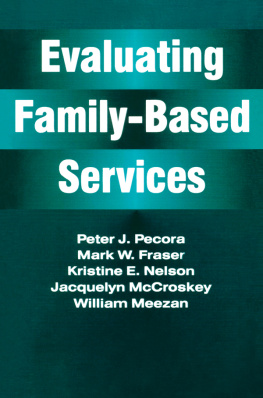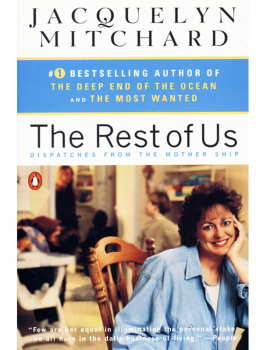Jacquelyn McCroskey - Evaluating Family-Based Services
Here you can read online Jacquelyn McCroskey - Evaluating Family-Based Services full text of the book (entire story) in english for free. Download pdf and epub, get meaning, cover and reviews about this ebook. year: 1995, publisher: Routledge, genre: Home and family. Description of the work, (preface) as well as reviews are available. Best literature library LitArk.com created for fans of good reading and offers a wide selection of genres:
Romance novel
Science fiction
Adventure
Detective
Science
History
Home and family
Prose
Art
Politics
Computer
Non-fiction
Religion
Business
Children
Humor
Choose a favorite category and find really read worthwhile books. Enjoy immersion in the world of imagination, feel the emotions of the characters or learn something new for yourself, make an fascinating discovery.
- Book:Evaluating Family-Based Services
- Author:
- Publisher:Routledge
- Genre:
- Year:1995
- Rating:5 / 5
- Favourites:Add to favourites
- Your mark:
- 100
- 1
- 2
- 3
- 4
- 5
Evaluating Family-Based Services: summary, description and annotation
We offer to read an annotation, description, summary or preface (depends on what the author of the book "Evaluating Family-Based Services" wrote himself). If you haven't found the necessary information about the book — write in the comments, we will try to find it.
Evaluating Family-Based Services — read online for free the complete book (whole text) full work
Below is the text of the book, divided by pages. System saving the place of the last page read, allows you to conveniently read the book "Evaluating Family-Based Services" online for free, without having to search again every time where you left off. Put a bookmark, and you can go to the page where you finished reading at any time.
Font size:
Interval:
Bookmark:
Kristine E. Nelson, Jacquelyn McCroskey,
and William Meezan

2 Park Square, Milton Park, Abingdon, Oxon OX14 4RN 711
Third Avenue, New York, NY 10017, USA
Product or corporate names may be trademarks or registered trademarks, and are used only for identification and explanation without intent to infringe.
p. cm. (Modern applications of social work)
Includes bibliographical references and index.
ISBN 0-202-36093-8 (cloth : acid-free paper)ISBN 0-202-36094-6
(paper: acid-free paper)
1. Family servicesUnited StatesEvaluation. 2. Family social workUnited StatesEvaluation. I. Pcora, Peter J. N. Series.
HV699.E84 1995 94-49161
362.8280684dc20 CIP
ISBN 13: 978-0-202-36093-5 (hbk)
Mary K. Rodwell
A SAMPLE RESEARCH PROPOSAL
Kristine E. Nelson, Jacquelyn McCroskey,
and William Meezan
- A primary worker or case manager establishes and maintains a supportive, empowering relationship with the family.
- A wide variety of helping options are used (e.g., concrete forms of supportive services such as food and transportation may be provided along with clinical services).
- Caseloads of two to twelve families are maintained.
- One or more associates serve as team members or provide backup for the primary worker.
- Workers (or their backup person) are available twenty-four hours a day for crisis calls or emergencies.
- The home is the primary service setting, and maximum utilization is made of natural helping resources, including the family, the extended family, the neighborhood, and the community.
- The parents remain in charge of and responsible for their family as the primary caregivers, nurturers, and educators.
- Services are time-limited, usually one to four months (Bryce & Lloyd, 1981).
Font size:
Interval:
Bookmark:
Similar books «Evaluating Family-Based Services»
Look at similar books to Evaluating Family-Based Services. We have selected literature similar in name and meaning in the hope of providing readers with more options to find new, interesting, not yet read works.
Discussion, reviews of the book Evaluating Family-Based Services and just readers' own opinions. Leave your comments, write what you think about the work, its meaning or the main characters. Specify what exactly you liked and what you didn't like, and why you think so.













